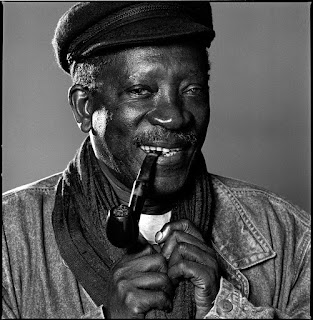As an author so concerned with social change, one of Sembène's goals had always been to touch the widest possible audience. After his 1960 return to Senegal, however, he realized that his written works would only be read by a small cultural elite in his native land. He therefore decided at age 40 to become a film maker, in order to reach wider African audiences.
In 1963, Sembène produced his first film, a short called "Barom Sarret" (The Wagoner). In '64 he made another short entitled Niaye. In 1966 he produced his first feature fim, La Noire de..., based on one of his own short stories; it was the first feature film ever released by a sub-Saharan African director. Though only 60 minutes long, the French-language film won the Prix Jean Vigo,[1] bringing immediate international attention to both African film generally and Sembène specifically. Sembène followed this success with the 1968 Mandabi, achieving his dream of producing a film in his native Wolof. Later Wolof-language films include Xala (1975, based on his own novel), Ceddo (1977), Camp de Thiaroye (1987), and Guelwaar (1992). The Senegalese release of Ceddo was heavily censored, ostensibly for a problem with Sembène's paperwork, but more probably for its anti-Muslim themes. However, Sembène distributed fliers at theaters describing the censored scenes and released it uncut for the international market. In 1971, Sembène also made a film in the Diola language and French entitled Emitai.
Recurrent themes of Sembène's films are the history of colonialism, the failings of religion, the critique of the new African bourgeoisie, and the strength of African women.
His final film, the 2004 feature Moolaadé, won awards at the Cannes Film Festival and the FESPACO Film Festival in Ouagadougou, Burkina Faso. The film, set in a small African village in Burkina Faso, explored the controversial subject of female genital mutilation.
Ousmane Sembène died on June 9, 2007, at the age of 84. He had been ill since December 2006, and died at his home in Dakar, Senegal.


No comments:
Post a Comment